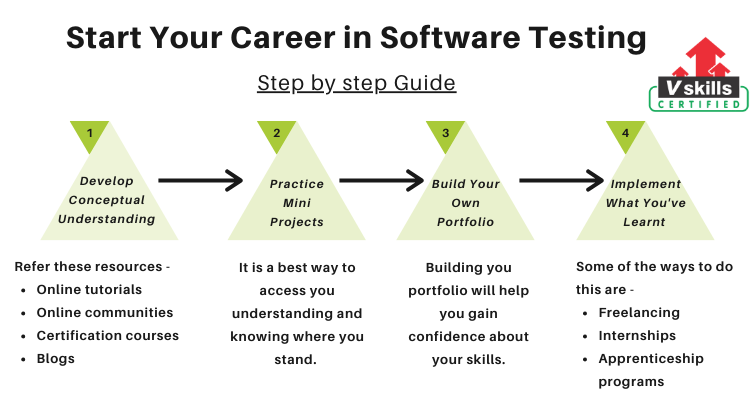Software Testing is the backbone of any IT product, Services Company. Industry size is about USD$13 billion globally and is one of the biggest recruiters and job creators around the world. One needs to have specialization in the field in order to get hired.
Let us analyse Career Path in Software Testing!
What is software testing?
Software testing is the method of determining whether or not a computer system or programme meets the required criteria and achieves the desired results. As a consequence, you find flaws in the software product or project. You’ll be busy understanding requirement papers, designing test cases, conducting test cases, reporting and re-testing bugs, holding review meetings, and participating in other team-building events on a regular work day.
Skills required
Some of the skills that land you a quick job quickly are –
- Basic knowledge of Database/ SQL: In the history of software systems, there is a large amount of data. In the backend, this data is stored in various databases such as Oracle, MySQL, and others. As a result, there will be times when this information needs to be checked. In that case, simple/complex SQL queries can be used to determine if the backend databases contain the correct data.
- Knowledge and hands-on experience of any Defect Tracking tool: The defect life cycle and defect tracking are important aspects of software testing. It is important to properly manage defects and monitor them in a systematic manner.
- Basic knowledge of Linux commands: The majority of software programmes, such as Web services, databases, and application servers, run on Linux machines. As a result, testers must be familiar with Linux commands.
- Knowledge and hands-on experience of Automation tool: If you want to be a “Automation tester” after a few years of manual testing, you’ll need to master a tool and gain in-depth, hands-on experience with automation software.
- Knowledge and hands-on experience of a Test Management Tool: The importance of test management in software testing cannot be overstated. Managing the research objects is what test management is all about.
How can you start your career in Software Testing?
To be acceptable at something, it is critical to have a good start with appropriate assets and learning content. As a result, in order to be a pro in this area, your first steps toward learning must be appropriate. Let’s take a look at some steps you can take to start your learning process –
Step 1 – Learn about the basics and Develop Conceptual understanding
You must first establish a stable foundation before you can become an expert in those fields. And you’ll need to have the right applied skills before you can move on to the practical labs. Everything has to begin somewhere. You must begin small if you want to have a successful career in this field. You may use the following tools to get a complete understanding of the domain:
- Firstly, Online Tutorials for Software Testing
- Also, Certification Courses from verified sources such as Vskills, Coursera, Udemy and so on.
- In addition, Online communities
- Moreover, Blogs and study material from experts in this field and many more.
Vskills also provide Online tutorials, certification courses and free practice tests for the same. You can check them out on our official site.
Step 2 – Practice Mini Projects
If you want to land in a good position, you must practise. It’s also a perfect way to see where you are in terms of putting your knowledge into effect. In practical aspects such as the application of Software Testing in ventures, experience will help you outlast other things. To better understand the practical aspects, you can supplement your learning by reading blogs and tutorials on various websites. You can also attend various conferences – domestic as well as international and various webinars in order to polish your skills.
Step 3 – Build Your Portfolio
Building a portfolio will help you gain trust in your abilities while also giving you a place to practise what you’ve learned. Your portfolio shows the ability to prepare and execute various codes, as well as the quality of your Software Testing skills. These tasks can provide a variety of datasets and provide readers with interesting tidbits of knowledge gleaned from your research. Your portfolio doesn’t have to be about a single subject; pick a few that interest you and see what you can do with them.
Step 4 – Implement your skills in Real world
It’s important to practise your skills, which is why you’ve spent so much time learning how to do it perfectly! It’s also important that you stay up to date and continue to improve your own skills. Some specialist courses may also be used to show advanced abilities. You are also welcome to attend. Here are some examples of how you can improve your abilities:
- Freelancing
- Internships
- Apprenticeship programs
The above steps will help you to get this domain started. It’s a long way to go, however. You can take an advanced course to reach a new level of skills.
Career opportunities in Software Testing
Some of the roles you can expect after gaining sufficient knowledge are –
Junior Software Tester / QA Engineer – The position of Junior Software Tester is an entry-level position. In most cases, people with no prior experience in software testing are recruited for this role. Software testing is open to everyone (as it does not involve training in any subject), however getting a bachelor’s degree in computer science is advantageous. Individuals who are already employed in other fields will transition into software testing by completing software testing training.
Senior Software Tester / Senior QA Engineer – In some organisations, this position is known as Senior QA Engineer. When it comes to determining a classification, each organisation has its own set of standards. The majority of senior roles are filled based on years of experience.
Test Architect – The Test Architect is a senior position that is responsible for finding solutions to problems that arise during research. The role requires in-depth technical expertise as well as current knowledge of the latest tools and technologies. People/team management skills are not required for this role. The role of Test Architect is uncommon. It’s only found in companies that put a lot of emphasis on testing automation and technology.
QA Lead/ Test Lead – Every organisation has its own set of requirements for defining a title, but certain roles come with team management skills by necessity. One of these positions is test lead.
Quality Lead – The rank of Quality Head is the highest in the Quality department. This role requires both technical and managerial abilities. This role is the product of years of experience and an established track record of effectively managing numerous teams, ventures, and services.
Market Demand
Certified Software Testing Professional may find employment in all kind of companies American Express, HCL, Tata Consultancy Services Ltd, Capgemini, IBM services, Samsung Labs. This is one of the blooming field in IT sector and can help you fetch good fortune.
Remuneration
A software tester’s pay varies depending on the organisation. Average salary range of a software tester in the US is $45,993 – $74,935. Average Software testing career package in India is Rs 247,315 – Rs 449,111. Also, a software tester is also given health insurance, bonuses, gratuity and other perks.
Conclusion
There is always a demand for good performance testers who can analyze the performance test results, identify the bottlenecks and suggest tuning techniques. There are a lot of companies, specializing in software testing, open source and integration services. International job consultants also are constantly looking for Software Testing Professionals for overseas jobs. The skill is also greatly in demand in super specialized government projects.
Discover the career opportunities in the field of Software Testing. Hurry up and start preparing now!



